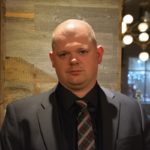 Travis Nielsen is the founder and CEO of Azurigen Management and Consulting Solutions Inc. A STEM project management firm that specializes in linking conservation based science to business and government. He is a published scientist specializing in Marine Biology with 10 years experience in STEM, and 10 years of experience in management and leadership. He has been responsible for projects with budgets up to $500,000, working with multiple stakeholders, large public engagement mandates, and with staffs up to 100 people in locations all across the globe.
Travis Nielsen is the founder and CEO of Azurigen Management and Consulting Solutions Inc. A STEM project management firm that specializes in linking conservation based science to business and government. He is a published scientist specializing in Marine Biology with 10 years experience in STEM, and 10 years of experience in management and leadership. He has been responsible for projects with budgets up to $500,000, working with multiple stakeholders, large public engagement mandates, and with staffs up to 100 people in locations all across the globe.
Walking into the airport one morning, my mind was still addled by the fog of waking up at 4am. I was heading to a conference for work and as I get to my ticket counter to check-in for my flight I am politely told by the counter staff that the flight had been cancelled. Confused, and curious as to why the flight was shut down, I enquired around until I found a friend that was on shift as a TSA agent, I asked what she knew, and it turns out that the flight was cancelled because one of the flight crew didn’t show up for work. The rumor was the crew member had a little too much fun at the pub and was nursing off a self-inflicted illness… I sighed and laughed to myself about how it was just my luck. This led to a magic adventure of cancellations and bookings for multiple flights and waiting for hours, just to leave the airport. The reason that this cancellation is now a funny story and not a vivid nightmare – the airline that cancelled the flight went out of its way to help me when things went sideways, giving me vouchers for food and hotel stays, helping me as best they could to get where I needed to go, and generally doing all it could to help. This help is what the business world calls ‘customer service’ and it is a critical part of every business out there, and for many small businesses, it can be the difference between success and failure.
In science, even though we deal with businesses daily, we rarely realize that we engage in customer service constantly! From professors dealing with the students they teach to the post-docs searching for in-kind services and grant money. To restate the cliché – Science is not done in a vacuum. Scientists should consider themselves an unconventional type of business entity that doesn’t sell a product or service, but instead deals in data and discovery – this is an invaluable product and service that keeps many industries going. As a result, customer service is an integral part of how we do science, and it should be obvious we need to keep our customer service skills sharp.